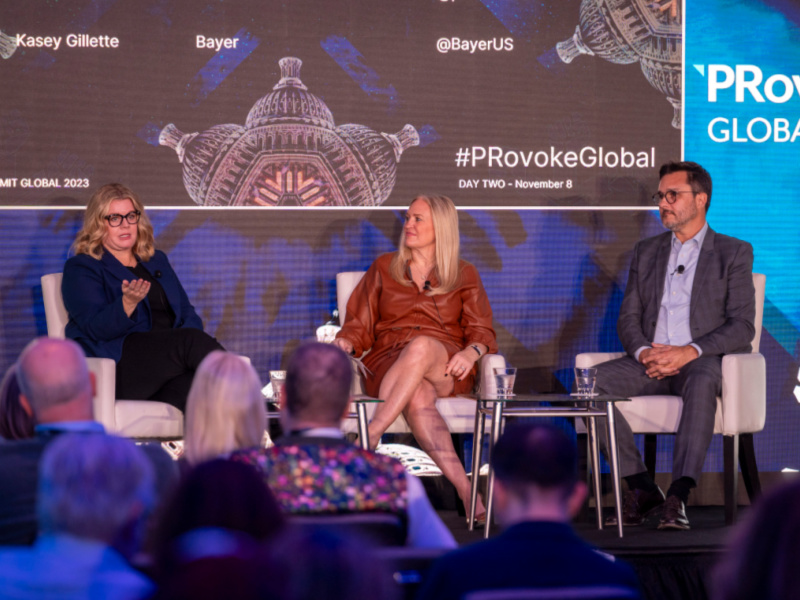Diana Marszalek 08 Nov 2023 // 9:38PM GMT

WASHINGTON — With consumers increasingly polarized, businesses are leveraging a range of tactics — which include tying actions to the core values of organizations — to authentically communicate without alienating stakeholders, speakers said Wednesday at the PRovokeGlobal summit in Washington.
“It’s important to stay true to what the company is,” said Jeff Werner, VP of corporate and government affairs for Panasonic North America, which has had its core principles in place for roughly a century. He highlighted the significance of consistency and authenticity in messaging, stating that they should be the guiding principles for business decisions and communication with multiple stakeholders.
Werner’s comments were part of a Porter Novelli-sponsored panel that explored the complexities businesses face in communicating authentically and purposefully without alienating audiences in the process. Kasey Gillette, Bayer’s senior director for sustainability and political affairs, also participated in the discussion, which was moderated by Porter Novelli global CEO Jillian Janaczek.
That polarization necessitates careful navigation to communicate effectively while maintaining and even growing a brand's consumer base was an overarching theme of the conversation, which, in featuring individuals who hold corporate and political affairs positions, offered perspectives and considerations beyond traditional communications.
Werner noted the potential risks when companies take positions on external social issues, particularly in the political realm, and stressed that with risk comes the need for strategic thinking and preparedness.
“You need to be consistent, and you have to look at precedent of what you’ve done in the past,” he said.
“This is all risk-related,” he said.
Gillette also stressed the value of demonstrating the authentic connection between a business and its actions, especially in a world where consumers receive information in real-time.
“The truth is, it’s complicated and we revisit it constantly,” Gillette said. Yet she, too, stressed the importance of harnessing a company’s mission statement as a “true north star” in weighing communications around divisive topics. “It helps us authentically connect our business to what we’re doing,” she said.
Doing that, as well as listening to stakeholders on all sides of divisive issues, goes a long way toward easing tensions around hot-button issues, even if not resolving differences among groups, be they internal or external stakeholders.
“You can show up in places with humility and respect and explain your position without alienating them,” Gillette said.
“If it's authentic, they understand what why you’re doing it even if they don’t agree with it,” she said.
Werner also underscored the importance of companies being duly prepared to handle today’s rampant polarization and how it can test brands’ positions and reputations.
“There’s always going to be some blow-back. I think you have to find a way to have that blow-back be heard. You simply have to expect it and be prepared for it,” Werner said. “But the balance is going to get harder and harder to strike”.
Both panelists underscored the idea that in a divided society, social responsibility is integral to business operations. They recognized that not addressing an issue is a position in itself, and they advocated for proactive engagement with social issues. Werner mentioned that businesses, regardless of their status, must adapt and modernize to meet the expectations of an increasingly socially conscious consumer base.



































.jpg)


















